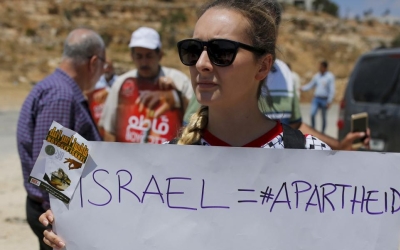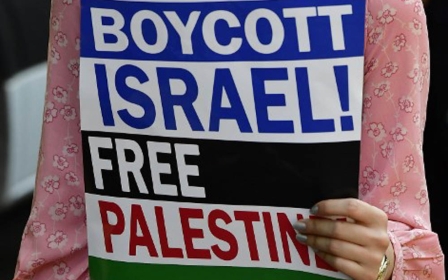US: CUNY's law faculty becomes latest university department to endorse BDS

The faculty of a major New York City university's law school has passed a resolution endorsing the Boycott, Sanctions, and Divestment (BDS) movement, becoming the latest department at an American university to show support for Palestinian rights.
The City University of New York (CUNY) Law Faculty unanimously endorsed the resolution last week, the New York Post has reported.
It was originally put forward by the law school's student government body, and co-sponsored by the university's chapters of Students for Justice in Palestine (SJP) and the Jewish Law Students’ Association (JLSA). The student body passed the resolution in December.
The resolution criticises CUNY's complicity "in the ongoing apartheid, genocide, and war crimes perpetrated by the state of Israel against the Palestinian people through its investments in and contracts with companies profiting off of Israeli war crimes".
New MEE newsletter: Jerusalem Dispatch
Sign up to get the latest insights and analysis on Israel-Palestine, alongside Turkey Unpacked and other MEE newsletters
"CUNY has a history of censoring, repressing, harassing, and surveilling Palestine solidarity activists, including current CUNY Law students and co-sponsors of this resolution," the resolution adds.
The BDS movement is a non-violent, Palestinian-led initiative encouraging individuals, nations and organisations to censure Israel's consistent violations of international law and human rights standards through a variety of boycotts.
The resolution endorsed by the law faculty states that CUNY has several deals with weapons and security companies that profit from Israel's occupation of Palestinian territories, such as Raytheon.
It also mentions that the university provides tuition-free training for NYPD officers, a department that runs a training exchange programme with Israel.
Last June, the CUNY staff congress - which represents 30,000 members across the university system - passed a resolution calling Israel a settler-colonial and apartheid state.
The university's chancellor, Felix V Matos Rodriguez, said in December that the school "cannot participate in or support BDS activities and is required to divest public funds from any companies that do".
In recent years, advocacy and activism surrounding Palestinian rights have increased at several universities across the country. Departments and bodies at several prominent institutions have also adopted resolutions in support of BDS, including Harvard University's Crimson newspaper, which endorsed the movement earlier this year.
In March, the Middle East Studies Association (Mesa), which consists of nearly 3,000 academics and educators from around the world, voted overwhelmingly to endorse the BDS movement.
However, at the same time, the US has seen dozens of states pass anti-BDS laws, in an attempt to stifle criticism of Israel.
Several academics have also stated that their support for Palestinians has hurt their careers, including prominent international academic Valentina Azarova, who was reportedly denied a position at the University of Toronto over her criticism of Israel.
Cornel West, a US activist, philosopher and academic, resigned from Harvard University last year, in part citing an "anti-Palestinian bias" as one of his reasons for leaving.
CUNY's Office of Communications and Marketing referred Middle East Eye to the university's law school. MEE has reached out to the CUNY law school for comment.
Middle East Eye delivers independent and unrivalled coverage and analysis of the Middle East, North Africa and beyond. To learn more about republishing this content and the associated fees, please fill out this form. More about MEE can be found here.





